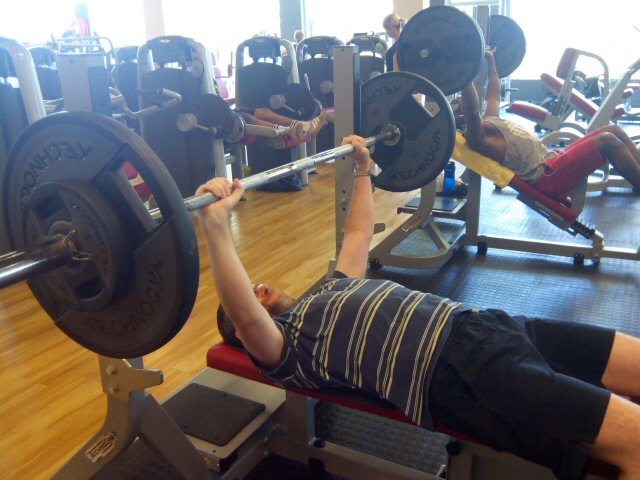Building muscle fast requires more than just lifting heavy weights—it’s a combination of strategic training, proper nutrition, and adequate recovery. Whether you’re a beginner or looking to break through a plateau, understanding the science behind muscle growth can help you achieve your goals efficiently. Here’s a step-by-step guide to gaining muscle the right way.
1. Prioritize Progressive Overload
One of the key principles of muscle growth is progressive overload, which means gradually increasing the resistance or intensity of your workouts. Your muscles need to be consistently challenged to grow. Here’s how you can implement progressive overload:
- Increase weight: Lift heavier weights over time while maintaining good form.
- Increase reps or sets: If you can’t lift heavier, aim to do more reps or sets.
- Reduce rest time: Shortening rest periods between sets can add intensity.
- Improve form and technique: Ensure proper execution to maximize muscle engagement.
2. Focus on Compound Movements
Compound exercises engage multiple muscle groups simultaneously, allowing you to lift heavier and build more muscle efficiently. Prioritize these fundamental movements:
- Squats: Target legs, glutes, and core.
- Deadlifts: Engage the entire posterior chain, including hamstrings and back.
- Bench Press: Strengthen chest, shoulders, and triceps.
- Pull-Ups/Chin-Ups: Develop back and biceps.
- Rows: Build a thicker and stronger back.
- Overhead Press: Improve shoulder and upper body strength.
3. Train with the Right Volume and Intensity
For muscle growth (hypertrophy), research suggests training in the 6–12 rep range with moderate to heavy weights (60-80% of your 1-rep max). A good guideline is:
- 3-5 sets per exercise
- 6-12 reps per set
- Rest 30-90 seconds between sets
- Train each muscle group 2-3 times per week
4. Optimize Your Protein Intake
Muscles require protein to grow and recover. The optimal daily intake for muscle gain is 1.6–2.2 grams of protein per kilogram of body weight (or 0.7–1.0 grams per pound). High-quality protein sources include:
- Lean meats: Chicken, beef, turkey
- Fish: Salmon, tuna, cod
- Eggs: Whole eggs are packed with protein and healthy fats.
- Dairy: Greek yogurt, cottage cheese
- Plant-based options: Lentils, tofu, quinoa
- Protein supplements: Whey or plant-based protein powder for convenience
5. Eat Enough Calories
To build muscle, you must be in a caloric surplus, meaning you consume more calories than you burn. Use this formula to estimate your daily calorie needs:
- Maintenance Calories = Bodyweight (lbs) × 15
- Muscle Gain Calories = Maintenance Calories + 250-500 kcal
Macronutrient breakdown for muscle building:
- 40-50% carbs (energy source)
- 25-35% protein (muscle repair and growth)
- 20-30% fats (hormonal function and overall health)
6. Get Enough Sleep and Recovery
Muscle growth doesn’t happen in the gym—it happens when you rest. Prioritize:
- 7-9 hours of sleep per night to optimize recovery and hormone production.
- Rest days to allow muscles to repair and grow.
- Active recovery (light cardio, stretching, yoga) to improve circulation and reduce soreness.
- Foam rolling and massages to enhance recovery and mobility.

7. Manage Stress and Optimize Hormones
High stress levels increase cortisol, which can hinder muscle growth. Manage stress through:
- Meditation and deep breathing techniques
- Proper time management and relaxation
- Avoiding excessive caffeine and alcohol
Testosterone plays a vital role in muscle growth. To naturally boost testosterone:
- Get adequate sleep
- Consume healthy fats (avocados, nuts, olive oil)
- Strength train with heavy weights
- Maintain a balanced diet
8. Stay Hydrated and Limit Alcohol
Hydration is crucial for muscle function and recovery. Aim for at least 3-4 liters of water daily. Dehydration can lead to muscle cramps, fatigue, and poor performance. Limit alcohol consumption, as it impairs protein synthesis and recovery.
9. Be Consistent and Track Progress
Muscle building takes time and dedication. Stay on track by:
- Tracking your workouts (weights, sets, reps) to monitor progress.
- Taking progress photos every 2-4 weeks.
- Measuring strength gains through performance improvements.
- Being patient and staying consistent with training and nutrition.
10. Consider Supplements (If Needed)
While not essential, supplements can help support muscle growth:
- Whey Protein: Convenient protein source post-workout.
- Creatine: Proven to increase strength and muscle mass.
- Branched-Chain Amino Acids (BCAAs): May help with recovery.
- Beta-Alanine: Enhances endurance and reduces fatigue.
- Multivitamins & Omega-3s: Support overall health.
Final Thoughts
Building muscle fast requires smart training, proper nutrition, and disciplined recovery habits. Stick to the fundamentals—progressive overload, compound exercises, high protein intake, and quality sleep—and you’ll see significant results over time. Stay patient, be consistent, and remember: muscle growth is a marathon, not a sprint.


